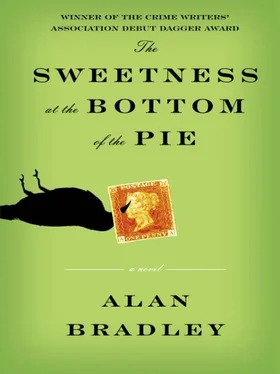Alan Bradley - The Sweetness at the Bottom of the Pie
Здесь есть возможность читать онлайн «Alan Bradley - The Sweetness at the Bottom of the Pie» весь текст электронной книги совершенно бесплатно (целиком полную версию без сокращений). В некоторых случаях можно слушать аудио, скачать через торрент в формате fb2 и присутствует краткое содержание. Жанр: Старинная литература, на английском языке. Описание произведения, (предисловие) а так же отзывы посетителей доступны на портале библиотеки ЛибКат.
- Название:The Sweetness at the Bottom of the Pie
- Автор:
- Жанр:
- Год:неизвестен
- ISBN:нет данных
- Рейтинг книги:3 / 5. Голосов: 1
-
Избранное:Добавить в избранное
- Отзывы:
-
Ваша оценка:
- 60
- 1
- 2
- 3
- 4
- 5
The Sweetness at the Bottom of the Pie: краткое содержание, описание и аннотация
Предлагаем к чтению аннотацию, описание, краткое содержание или предисловие (зависит от того, что написал сам автор книги «The Sweetness at the Bottom of the Pie»). Если вы не нашли необходимую информацию о книге — напишите в комментариях, мы постараемся отыскать её.
The Sweetness at the Bottom of the Pie — читать онлайн бесплатно полную книгу (весь текст) целиком
Ниже представлен текст книги, разбитый по страницам. Система сохранения места последней прочитанной страницы, позволяет с удобством читать онлайн бесплатно книгу «The Sweetness at the Bottom of the Pie», без необходимости каждый раз заново искать на чём Вы остановились. Поставьте закладку, и сможете в любой момент перейти на страницу, на которой закончили чтение.
Интервал:
Закладка:
Soon, I found myself poring over its pages in every spare moment. There were evenings when I could hardly wait for bedtime. Harriet's book had become my secret friend.
In it were detailed all the alkali metals: metals with fabulous names like lithium and rubidium; the alkaline earths such as strontium, barium, and radium. I cheered aloud when I read that a woman, Madame Curie, had discovered radium.
And then there were the poisonous gases: phosphine, arsine (a single bubble of which has been known to prove fatal), nitrogen peroxide, hydrogen sulfide…the lists went on and on. When I found that precise instructions were given for formulating these compounds, I was in seventh heaven.
Once I had taught myself to make sense of the chemical equations such as K 4FeC 6N 6+ 2K = 6KCN + Fe (which describes what happens when the yellow prussiate of potash is heated with potassium to produce potassium cyanide), the universe was laid open before me: It was like having stumbled upon a recipe book that had once belonged to the witch in the wood.
What intrigued me more than anything was finding out the way in which everything, all of creation—all of it!—was held together by invisible chemical bonds, and I found a strange, inexplicable comfort in knowing that somewhere, even though we couldn't see it in our own world, there was real stability.
I didn't make the obvious connection at first, between the book and the abandoned laboratory I had discovered as a child. But when I did, my life came to life—if that makes any sense.
Here in Uncle Tar's lab, row on row, were the chemistry books he had so lovingly assembled, and I soon discovered that with a little effort most of them were not too far beyond my understanding.
Simple experiments came next, and I tried to remember to follow instructions to the letter. Not to say that there weren't a few stinks and explosions, but the less said about those the better.
As time went on, my notebooks grew fatter. My work was becoming ever more sophisticated as the mysteries of Organic Chemistry revealed themselves to me, and I rejoiced in my newfound knowledge of what could be extracted so easily from nature.
My particular passion was poison.
I SLASHED AWAY at the foliage with a bamboo walking stick pinched from an elephant-foot umbrella stand in the front hall. Back here in the kitchen garden, the high redbrick walls had not yet let in the warming sun; everything was still sodden from the rain that had fallen in the night.
Making my way through the debris of last year's uncut grass, I poked along the bottom of the wall until I found what I was looking for: a patch of bright leaves whose scarlet gloss made their three-leaved clusters easy to spot among the other vines. Pulling on a pair of cotton gardening gloves that had been tucked into my belt, and launching into a loudly whistled rendition of “Bibbidi-Bobbidi-Boo,” I went to work.
Later, in the safety of my sanctum sanctorum, my Holy of Holies—I had come across that delightful phrase in a biography of Thomas Jefferson and adopted it as my own—I stuffed the colorful leaves into a glass retort, taking care not to remove my gloves until their shiny foliage was safely tamped down. Now came the part I loved.
Stoppering the retort, I connected it on one side to a flask in which water was already boiling, and on the other to a coiled glass condensing tube whose open end hung suspended over an empty beaker. With the water bubbling furiously, I watched as the steam found its way through the tubing and escaped into the flask among the leaves. Already they were beginning to curl and soften as the hot vapor opened the tiny pockets between their cells, releasing the oils that were the essence of the living plant.
This was the way the ancient alchemists had practiced their art: fire and steam, steam and fire. Distillation.
How I loved this work.
Distillation. I said it aloud. “Dis-till-ation!”
I looked on in awe as the steam cooled and condensed in the coil, and wrung my hands in ecstasy as the first limpid drop of liquid hung suspended, then dropped with an audible plop! into the waiting receptacle.
When the water had boiled away and the operation was complete, I turned off the flame and cupped my chin in my palms to watch with fascination as the fluid in the beaker settled out into two distinct layers: the clear distilled water on the bottom, a liquid of a light yellow hue floating on top. This was the essential oil of the leaves. It was called urushiol and had been used, among other things, in the manufacture of lacquer.
Digging into the pocket of my sweater, I pulled out a shiny gold tube. I removed its cap, and couldn't help smiling as a red tip was revealed. Ophelia's lipstick, purloined from the drawer of her dressing table, along with the pearls and the Mint Imperials. And Feely—Miss Snotrag—hadn't even noticed it was gone.
Remembering the mints, I popped one into my mouth, crushing the sweet noisily between my molars.
The core of lipstick came out easily enough, and I relit the spirit lamp. Only a gentle heat was required to reduce the waxy stuff to a sticky mass. If Feely only knew that lipstick was made of fish scales, I thought, she might be a little less eager to slather the stuff all over her mouth. I must remember to tell her. I grinned. Later.
With a pipette I drew off a few millimeters of the distilled oil that floated in the beaker and then, drop by drop, dripped it gently into the ooze of the melted lipstick, giving the mixture a vigorous stir with a wooden tongue depressor.
Too thin, I thought. I fetched down a jar and added a dollop of beeswax to restore it to its former consistency.
Time for the gloves again—and for the iron bullet mold I had pinched from Buckshaw's really quite decent firearm museum.
Odd, isn't it, that a charge of lipstick is precisely the size of a .45 caliber slug. A useful bit of information, really. I'd have to remember to think of its wider ramifications tonight when I was tucked safely into my bed. Right now, I was far too busy.
Teased from its mold and cooled under running water, the reformulated red core fitted neatly back inside its golden dispenser.
I screwed it up and down several times to make sure that it was working. Then I replaced the cap. Feely was a late sleeper and would still be dawdling over breakfast.
"WHERE'S MY LIPSTICK, you little swine? What have you done with it?”
"It's in your drawer," I said. "I noticed it when I purloined your pearls."
In my short life, bracketed by two sisters, I had of necessity become master of the forked tongue.
"It's not in my drawer. I've just looked, and it isn't there."
"Did you put on your specs?" I asked with a smirk.
Although Father had had all of us fitted with spectacles, Feely refused to wear hers and mine contained little more than window glass. I wore them only in the laboratory to protect my eyes, or to solicit sympathy.
Feely slammed down the heels of her hands on the table and stormed from the room.
I went back to plumbing the depths of my second bowl of Weetabix.
Later, I wrote in my notebook:

Friday, 2nd of June 1950, 9:42 A.M. Subject's appearance normal but grumpy.
(Isn't she always?) Onset may vary from 12 to 72 hours.
I could wait.
MRS. MULLET, WHO WAS short and gray and round as a millstone and who, I'm quite sure, thought of herself as a character in a poem by A. A. Milne, was in the kitchen formulating one of her pus-like custard pies. As usual, she was struggling with the large Aga cooker that dominated the small, cramped kitchen.
"Oh, Miss Flavia! Here, help me with the oven, dear."
Читать дальшеИнтервал:
Закладка:
Похожие книги на «The Sweetness at the Bottom of the Pie»
Представляем Вашему вниманию похожие книги на «The Sweetness at the Bottom of the Pie» списком для выбора. Мы отобрали схожую по названию и смыслу литературу в надежде предоставить читателям больше вариантов отыскать новые, интересные, ещё непрочитанные произведения.
Обсуждение, отзывы о книге «The Sweetness at the Bottom of the Pie» и просто собственные мнения читателей. Оставьте ваши комментарии, напишите, что Вы думаете о произведении, его смысле или главных героях. Укажите что конкретно понравилось, а что нет, и почему Вы так считаете.












